- Home
- Pierce Brown
Iron Gold Page 32
Iron Gold Read online
Page 32
In the market, we amble through stalls of foods from four planets and ten continents. Fatty strips of beef bubble over charcoal grills. Seafood simmers in oil. Squid steams in marrow vapor. Vegetables, flash-frozen and shipped from Earth, like all the rest of it, glimmer wetly in clear plastic. The air is soupy with the scent of cloves and Martian cumin and curry, making my mouth water. We choose two foils of Pacific sweet fried cod, a plastic bowl with olives swimming in oil, European Gruyère cheese wrapped in South American prosciutto and baked in a flaky pastry, and for dessert a pint of jasmine ice cream and custard-stuffed dates. We lay the spread on the grass and eat while watching the children’s kites bank in the sky.
“I like watching them,” Lyria says about the children.
I mutter something neutral.
“All they know is that their parents love them and they like kites. Do you like kites?”
“Who doesn’t like kites?”
“I don’t imagine the Sovereign likes kites.”
“No?”
“No.” She takes on a pompous, hilarious Martian Aureate accent: “What are these bits of paper, floating in yonder air? For what efficacious purpose do they exist? The betterment of man? I think not. Put the paper toward the troops! The string to the nurses! The children to the munitions plants!”
I smile, but with a half dozen milligrams of zoladone in the veins, I can’t find it in me to laugh. “Children fly them on Mercury, you know. From the parapets and rooftops. Thousands of kites in midsummer.”
“Have you seen it yourself?” she asks.
“Just once. On a work trip for a former employer.”
“That must have been beautiful,” she says dreamily.
I feel the sudden need to quash her enthusiasm. “But they use glass string and angle them to cut each other’s kites out of the sky till there’s only one left.”
“Why?”
“What’s more human than competition?”
“Thousands of losers and one winner? That’s so sad.”
I snort. “Sounds like something Volga would say.”
“Volga?”
I realize my mistake. “A friend of mine,” I say instinctively.
She snorts. “You have friends besides me? The nerve.” She smiles. “Really, I’d love to meet her. Volga. That’s an Obsidian name, isn’t it?” She looks apprehensive at the idea.
“Lamentably, she is no longer with the living,” I say, and as I say it, I feel like I’m not with the living. Not tethered to any of the people around me. All these lies to this girl, and for what? Money? My life? I settle back against a tree to close my eyes, hoping Lyria forgets the name and lets the subject die.
“How’s the Telemanus family coping with the peace talks?” I say to distract her. She’s caught off guard. I’ve never asked about them before.
“They think Caraval is playing both sides. And that Dancer can’t control the Vox like he thinks he can.”
“Interesting.”
“Something’s happened.” She squints. “Something bad. I’m not sure what, but it was on Earth. They’ve been sealed up in the Sovereign’s wing for days.”
“Hm.” I let the subject die, lest she become suspicious.
Despite everything, it feels good to lie down and ease the ache between my shoulder blades. I’ve not been sleeping well in my apartment. I never do when it’s a bright month. Up all bright night pacing back and forth in front of the smoke glass, racing through burners and watching that Gold bitch kill Trigg again and again on my holocube. The two of them are doing their little dance across my gray matter, and the Reaper watches, huddling with Holiday as Trigg dies and dies and dies, for him. For their messiah.
What would Trigg think of how this has all turned out?
Seven years ago, Luna was a war zone choking on dust and debris, her sky groaning with bombers. But today there are children laughing, children born who’ve never seen those bombers or the mechanized legions that once prowled the cityscape. The sky is warm and friendly. The air cool. The girl beside me breathing shallowly. And I feel, despite myself, at ease enough to drift to sleep.
“I’ve been thinking about what you told me,” the girl says suddenly. I look over at her from under my shades. She’s on her back, her eyes closed, shirtsleeves rolled up so the autumn sunlight can warm her dark forearms.
“Oh dear. Whatever did I prattle on about now?” I ask.
“About seeing myself before others see me.”
“Oh, that. Forgive the proselytization, I was quite well sorted.”
“You weren’t that drunk,” she says. Her eyes are open now and watching the kites. “I’ve never really been alone before. I mean, I have my nephew, Liam, here. But he’s so done up in the Citadel school that I hardly see him. And when I do, it hurts both of us. Reminds us of who isn’t here.” I turn on my back and look over at her, propping myself up with an elbow. “So when you said I have to see myself before anyone else does, I look and I…well, I look and I don’t see anything.” This is hard for her, but she steels herself and goes forward. I find myself admiring the resoluteness in her face. The zoladone must be fading on account of the food in my gut. “In Lagalos, I was always minding my family. Watching my little brothers so Mum could sleep. Stitching my big brothers’ clothes together with my sister. Patching boots. Then they sent me to school to learn how to work a silkery. Didn’t much change after the Rising. Kept on minding my job, my family. And when we got out to the camps, it was the same. Only my brothers left and soon I was minding my father and my jobs and my sister’s little ones.”
I wish she would stop telling me her story. I can tell she’s kept this pain locked in a dark little chest inside her, just like I did. But I’m not the good person she is. I want her to be a little nasty creature. Want to see the ugliness I know everyone’s got inside them seething out of her eyes, spewing out of her mouth. But all that comes are little tears.
We’re not alike.
I hoard my pain, because no one will understand it. She’s just been looking for someone she can trust. Someone to share it with. Not me, stupid girl. I don’t deserve it. But she keeps going, and I feel heavier and blacker on the grass, wishing I took more zoladone.
“When the Red Hand came, I thought I’d be braver. You know, get a gun like they do in the flicks. But everything felt so fast. And I felt so small. All I wanted to do was sink in the mud.” She wipes her eyes and returns her arms to guard her chest.
“And you feel guilty for being here, when they’re not,” I ask quietly.
“Yeah.”
I hesitate. “Don’t you think they’re waiting for you in the Vale?”
“I don’t know. I hope so.”
“And if they were watching you, would they be proud?”
She considers, looking up at me with glassy eyes. “I hope so.”
We linger in the park till our ice cream has melted. I walk with her back to the tram depot so she can return to the Citadel. We hug farewell, and as I planned, I take off my necklace and fix my face with compassion, but the words don’t come as smoothly as intended. They stick in my throat.
“Philippe?”
“I want you to have this.” I push the locket into her hands. “To wear it. It’s always brought me strength.”
“I can’t take that….Your fiancé…”
“Gave it to me so I’d remember wherever I went I had him with me. But I don’t need a pendant for that. But you should be reminded that wherever you go, you’re not alone. We’re friends, aren’t we?”
“I think you’re my only friend.”
“And what do friends do? Friends help each other. You carry my shadows. I carry yours for a spell.” I take an imaginary necklace from her neck and put it on myself and buckle my knees like it’s a great weight. She laughs. “Maybe then we’ll both be a bit lighter when next we meet.”
“Do you think he’s watching you? Your fi—your husband. Not from the Vale, course. I know you lot don’t believe. But from some
where?” She stares up at me from under her mop of red hair.
“No, I don’t.”
“I think you’re wrong. I think he’s watching you. And I think he’s smiling and got a twinkle in his eye.” She bundles her coat and heads to the depot, but turns around and runs back to me to give me a small kiss on the cheek. “You’re not alone either, Philippe.”
Sweet little rabbit, if only that were true.
SUNGRAVE, THE GREATEST CITY of Io, surges up out of a white, frozen plain riven with fissures venting heat from subterranean magma. We fly toward it looking out the forward windows of one of Dido’s chimeras.
Carved into Io’s highest mountain, the eighteen-kilometer-high Boösaule, Sungrave is a city of black stone obelisks and spires that rides the shoulders of the mountain range. Centuries ago, after the use of Lovelock engines was deemed inefficient for Io, great mirrored lasers carved much of the mountain and part of its attending 540-kilometer-long range into a city of jagged towers. The builders followed the draconic predilections of their great progenitor, Akari, bringing creatures of childhood fables and ancient campfire stories to life in the stone.
A necropolis of animalistic spires flecked with topaz, zircon, and myriad nesosilicate rocks looms above us, blocking the sky like the petrified remains of a great dragon host. They perch rank upon rank along the Boösaule’s crest, some of them encompasing whole peaks, legs straddling frosted valleys, their wide wings buttressing their great heights as they crane their stone necks up as if to drink the gases of marbled Jupiter. Duroglass windows glitter with internal light, like scales. And deeper in the heart of the mountain, where long ago Red drillcrews dug out the interior, lies the city itself.
The city, like all the other mountain cities of Io, draws its energy from the tidal heating caused by the war of Jupiter’s gravity on Io against the gravitational pull of Europa and Ganymede. The cities of Raa need no helium-3 to survive or power the pulseFields that shield them from radiation and Io’s poisonous air. That is why they survived my grandmother’s siege ten years ago—their shields could resist bombardment longer than the helium-3 power generators of the Sword Armada’s ships could keep them in orbit. Still, I expected Io to be a desolate backwater, beset by rationing and scant starship flight; but the ship that captured the Archimedes was brand new. As are many of the trade and war vessels that flow into Sungrave’s high stone docks like itinerant gnats.
I look over at Cassius and feel his unease.
How were those ships built? On what dock?
New Olympic Knights, new ships, a new generation. The Rim has not been sleeping. And now, if they gain Seraphina’s evidence, they will awaken.
—
The scent of foreign incense fills my nose as the steam from the caldarium walls filters soundlessly up from the hypocaust beneath the floor into the dim room. Two sets of hands knead the knots of tension from my shoulders and legs. The bruises inflicted by Pandora’s men are now faded pools the color of sulfur on my shoulders and jaw. Somewhere in the steam, Cassius bathes alone in the solium, a large pool sunken into the rough-cut stone. Since Dido’s wafer, time has passed like a dream, my body flushed again with the life of water and food which Dido’s men gave us on the flight to Sungrave.
As a child, I surrendered to the disappointing reality that I would never see fabled Sungrave in person. It would be too great a risk to send the heir to a place where he might be captured and held for ransom. But I am heir no longer, and my eyes are greedy for all Sungrave’s sights, to see her depths, her botanical complexes, her great mountain cisterns filled with Europan water.
It is so different here from my home on Luna. Not just the acrid air and the dim sky, but the unforgiving stone, the Spartan decor—empty rooms, no chairs, and an incredible adherence to cleanliness and martial virtue. Seraphina gave me an all-too-brief tour after we arrived and I was taken to my quarters, but in her presence I noted less of the city than I would like. My eyes would drift to the back of her proud neck as she led me through her childhood corridors, like she was a black hole, pulling all light, all attention into her, not just from me, but from the servants, from the guards. She is much loved.
Little Hawk, they call her affectionately. Barely twenty. Not a Praetor or a Legate—those titles must be earned—just a woman of worth and promise. Yet despite her mother’s consolations, the guilt of her actions against her father seems to weigh heavily on her. She said little before depositing me in my quarters and disappearing before the door had closed.
When the Pinks have finished their massage, they scrape the oil and dead skin from my body with strigils, flattened bronze hooks, which they put into a clay pot for some recycled use. Nothing here goes to waste. One offers me a pipe of dried tharsal root. Head already woozy from the steam, I decline the mild hallucinogen. Then the slaves ask me how I would like to take them. Their legs are eerily long from the low gravity of their home. Their skin, unblemished by the sun, is burnished and smooth and without hair. The hair of their heads is thick, the male’s silver, the female’s a black so deep it shines blue near the lamps. She’s older than he is, with quartz eyes and the frailness of a small bird. But her mouth is truculent, her eyes not so empty as they should be. They startle me when they meet mine, and the spell the warmth and their hands cast is broken. She sees me.
A deep revulsion, physical and intellectual, twists the lust into a knotted, blackened thing.
I can’t look at them as my ancestors did, as consumable treats.
One could argue for the necessary industry of Reds or the cultlike military religion instilled in Grays, or the efficiency and neutered emotions in Coppers, but this…Pinks were not needed to make my grandmother’s world function. They were built for lechery, subjected to centuries of systematic breeding, abuse, psychological and sexual domination. Chemically neutered and twisted inside so that their suicide rate is eleven times higher than that of any other Color.
Gold is to blame for that. Gold lost its way.
And now this Pink woman looks at me with eyes too ancient for her face.
“What’s your name?” I ask her.
“This one’s name is Aurae,” she says.
I gently take the Pink’s hand from my thigh. “That will be enough, Aurae.” The male Pink looks awash with shame, thinking himself not beautiful enough; but in the woman, I see a small tell, a spasm of relief at the corners of her eyes. Then she feigns shame like the other one. Strange.
“We shouldn’t insult them,” Cassius says from the pool. “Come, join me. There’s enough room for the two of you.” The Pinks rise to obey.
“Like the Brothers Rath, are we now?” I ask.
He sighs. And motions for the Pinks to leave. They do. My eyes follow Aurae out the door. I ponder her relief. When they’ve left, Cassius casually taps his ear to show that we’re no doubt being listened to. Of course I know that. Does he forget where I grew up? “I think we deserve a little fun, Castor. Water torture, enduring that family squabbling, the beatings…” He laughs. “Besides, they’re slaves, and you’re not their savior. Romantic as you find the notion to be.”
“You know, not everything you say to me has to be a lesson,” I say.
“If you didn’t need them, I wouldn’t teach them. Anyway, looks like Pytha owes me fifty credits.” He sighs contentedly to himself and leans his broad shoulders back in the bath.
“What for?” I ask, unable to not take the bait.
“Friendly wager. She couldn’t possibly believe you were still a virgin.”
“What?”
“A virgin. It’s when a man or woman has not…”
“I hardly think that’s any of your concern. I’m not, as it is.”
He closes his eyes against the steam. “Then why turn them away? You sure it’s not because you’re afraid she’s watching?”
“Of course not,” I say sharply. Is Seraphina watching?
He chuckles. “See? Pent-up sexual aggression.”
“Just because I believe
in actual romance instead of plundering the virtue from merchants’ daughters and buggering everything that moves like a gorydamn Gaul does not mean that I should be shamed.”
“ ‘Like a gorydamn Gaul?’ My goodman, you curse like you’re ninety.”
“And you’re a hypocritical fornicator.”
“Gods, you really haven’t been laid, brother.”
“Will you stop talking.” I throw one of the strigils at him. He ducks into the water before pulling himself out to join me on the tile bench. He nudges me with his shoulder after a spell to lighten the mood—difficult considering we both know they’re analyzing us now, attempting to peel back our story to see if we are spies. Neither one of us is convinced the brotherly spat is just for show, though that might be our excuse.
“Seraphina told me Pytha was alive,” I say, trying to change the subject.
“My guards said the same to me. But don’t get too comfortable. We’re not guests here. When when the coup is over, our heads will likely roll.”
“You don’t think it will succeed?”
“Tell me you didn’t see the doubt in the daughter.”
I nod. “I didn’t think that was the reason for it.”
He laughs. “Don’t be so easily impressed by a rogue century of Peerless. Dido’s sharp, but she’s Venusian. The Rim won’t forget that. The minor Lords of Io will be coming from all over the moon, loyal to Romulus. And if they don’t finish her off, the Lords of Europa and Ganymede, likely even Callisto, will do it. Not to mention the Far Rim. They like their Romulus out there.”
“And what about their evidence?”
“Did you see her bring anything back?”
“No.”
“Well then, either she hid it well, or it was a bluff.”
I know without him saying it that he blames me for our current predicament, but it was his decision to investigate the Vindabona. His decision to take away everything I had as a boy and then act like he was my savior.
He lives in a fiction, espousing a moral code to justify killing his Sovereign, turning his back on our Society, but I know why he really did it—because she let the Jackal kill his family. The sanctimonious morality came long afterwards. This noble Morning Knight is built on a foundation of self-interest. And now, because he trusts no Golds, he decides we will anger our hosts in hopes they will want our services, when instead he should swallow his pride and see if their hospitality is genuine, as I do.

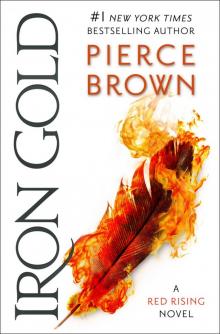 Iron Gold
Iron Gold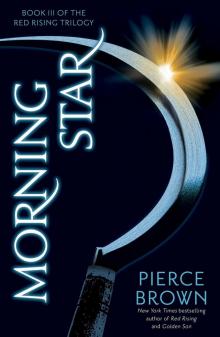 Morning Star
Morning Star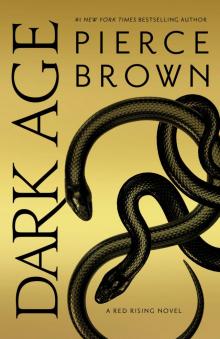 Dark Age
Dark Age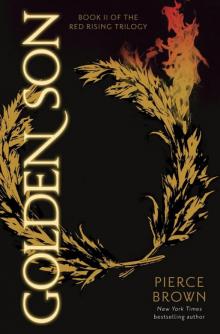 Golden Son
Golden Son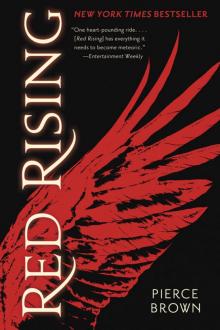 Red Rising
Red Rising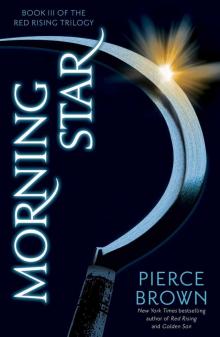 Morning Star: Book III of The Red Rising Trilogy
Morning Star: Book III of The Red Rising Trilogy